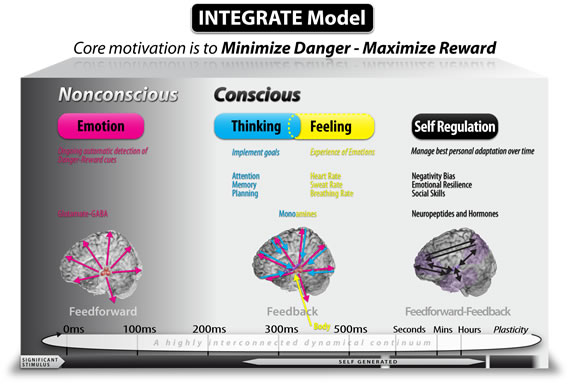Mental Training Techniques of Top Athletes
Top athletes are not only physically fit but also mentally fit. They use mental training routines just as they use physical training routines. Fortunately, many if not all of their mental training routines can be used to improve brain function or enhance cognitive performance in non-sports related contexts.
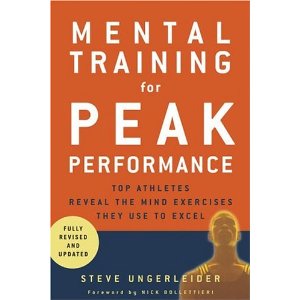 A great resource for exploring these techniques is Steven Ungerleider’s book, Mental Training for Peak Performance. He offers an introduction to mental training and then covers specific techniques including affirmations, self-talk, breathing, mediation, mental snapshots, guided-imagery, visual rehearsal and even dreams. We have covered many of these techniques in the Next Brain blog, but Dr. Ungerleider brings refinements and deeper insights to nearly all of them.
A great resource for exploring these techniques is Steven Ungerleider’s book, Mental Training for Peak Performance. He offers an introduction to mental training and then covers specific techniques including affirmations, self-talk, breathing, mediation, mental snapshots, guided-imagery, visual rehearsal and even dreams. We have covered many of these techniques in the Next Brain blog, but Dr. Ungerleider brings refinements and deeper insights to nearly all of them.
Take for example the use of guided-imagery. This is a technique involves forming vivid mental images and controlling them to practice “in your head” and manage anxiety and performance stress. Ungerleider’s approach stresses understanding how the individual experiences the image – sight, hearing, touch and feel. Other approaches I’ve seen assume we experience images with sight only. He has even developed a Sport Imagery Questionnaire (pgs. 56-57) to help you figure out how you experience images. You assess yourself in four different situations – practicing alone, with others, watching a teammate and competing – and rate how you experience images (1-5) in terms visual (what you saw), auditory (what you heard), kinesthetic (what you felt) and mood (how you felt). You use the results to customize routines for generating and controlling vivid imagery.
I completed the questionnaire and was surprised to find that mood played a key role in how I experience mental imagery. I used this to change my approach to guided-imagery with some good results.
Interested to hear from readers about their experience using the mental training techniques inspired by sports.
Categories: Books, Manage Emotions, Memory and Learning, Mental Focus, Perception, Training Tags: sports
Training for a High-Performing Emotional Brain
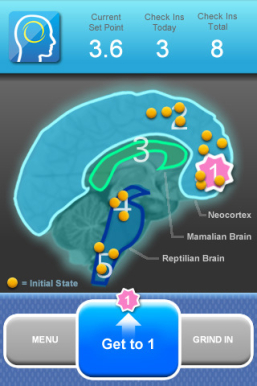 Emotions play a key and often dominate role in our brain function and cognitive performance. We create emotions anytime we appraise or make judgments on people, events, ideas or other things. Our ability to spot, understand and manage emotions in ourselves and others correlates more strongly to life success than IQ. So-called emotional intelligence is a cornerstone for high performance learning, decision-making, creativity, collaboration and other mental and social processes. So I am also on the lookout for new science-based techniques for training my emotional brain.
Emotions play a key and often dominate role in our brain function and cognitive performance. We create emotions anytime we appraise or make judgments on people, events, ideas or other things. Our ability to spot, understand and manage emotions in ourselves and others correlates more strongly to life success than IQ. So-called emotional intelligence is a cornerstone for high performance learning, decision-making, creativity, collaboration and other mental and social processes. So I am also on the lookout for new science-based techniques for training my emotional brain.
For example, take the work on Emotional Brain Training or EBT. It provides a simple way to assess which of five core brain states you are in and then suggests a tool for achieving self-regulation . The five brain states and associated tools are related to your level of stress and include:
- Balanced/reward (joy) state use the Sanctuary tool
- Balanced state use the Feelings check tool
- Verge of stress (mixed) state use the Emotional Housecleaning tool
- Stressed (unbalanced) state use the Cycle tool
- Full blown stress (underwhelmed) state use the Damage control tool
To get started right away you can download the Emotional Brain Training iPhone app (shown above) or find the equivalent in the Droid market.
 If you want to understand more of the theory behind how it works check out the new book, Wired for Joy. Or consider some of the training and coaching offerings from the Institute for Health Solutions.
If you want to understand more of the theory behind how it works check out the new book, Wired for Joy. Or consider some of the training and coaching offerings from the Institute for Health Solutions.
I am just learning to use EBT and am interested to hear from readers that have some experience with one or more of the five tools.
Categories: IQ and EQ, Lifestyle, Manage Emotions, Software, Training Tags: emotion, EQ, smart phone
Phosphatidylserine Improves Thinking in 10 Days
 Phosphatidylserine is a supplement that some claim can stave off cognitive decline in the elderly and boost memory, learning, mood and decision-making in people of all ages. I have seen conflicting studies so I am always on the look out for new ones that are done with great scientific rigor and that might help settle the issue.
Phosphatidylserine is a supplement that some claim can stave off cognitive decline in the elderly and boost memory, learning, mood and decision-making in people of all ages. I have seen conflicting studies so I am always on the look out for new ones that are done with great scientific rigor and that might help settle the issue.
Found one recently that was presented at the 7th Annual International Society of Sports Nutrition Conference. It was a small study but it was double blinded and placebo controlled. You can read about it in, Study Shows PS Use Improves Cognition Prior To Exercise.
Here is the key finding:
“Cognitive performance was measured by the serial subtraction test (SST), a validated method in which subjects repeatedly subtract from 1,579 by intervals of seven. PS supplementation did reduce the time needed for a correct calculation by 21%, reduced the total amount of errors by 38% and increased the amount of correct calculations per error by 42% prior to exercise.”
To achieve this effect athletes took 400 mg a day for 10 days. I don’t think “safe and effective” dose guidelines have been established I have seen other studies and recommendations that use between 300-500mg daily.
I am not advocating the use of this supplement. I am however, interested in hearing from readers that use it. What dose, how long and what kind of benefits or side effects are you experiencing?
Categories: Cognitive Decline, Decision Making, Diet, Manage Emotions, Memory and Learning Tags: smart drugs
Integrated Brain Training Over the Web
MyBrainSolutions offers a software-based brain training program over the web. There are also some apps for your smart phone. You can sign up for the basic membership for free or pay $9.95/month for the premium service. With the premium service you complete a brain assessment and get training recommendations based on your specific needs. You also get access to more training exercises. The basic membership gives you four. With both memberships you get a personal dashboard (web page) that provides access to your tools and results.
The program appears unique in its emphasis on emotions, thinking, feelings and self-regulation and how they work together in an integrated way. You can watch a five minute video on the site that explains it. The emphasis on automatic processing of emotional queues (mainly facial expressions) and how that shapes our intuitions and decision-making, is right on. I have not seen any other brain training program tackle that.
I am using the basic membership and like what I see. Interested to hear from readers that have purchased the premium membership. Is it worth $10 per month? Thanks.
Categories: Executive Function, Manage Emotions, Memory and Learning, Software Tags: brain training, EQ, smart phone
Tai Chi for Cognitive Training?
Tai Chi is an ancient Chinese practice for linking mind and body in a martial art. Today it is a low-impact form of exercise and wellness that may improve a number of cognitive functions including mental focus, memory, managing emotions and perception.
Tai Chi involves a series of fluid, slow-paced motions and stretches that have been described as “meditation in motion”. The benefits of Tai Chi have just started to be formally studied. An in depth article on the Mayo Clinic website, Tai Chi: Discover the many possible health benefits, reports there is preliminary evidence for these benefits:
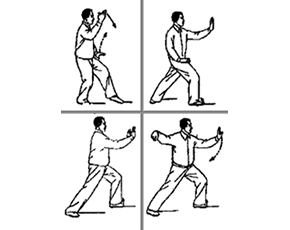 Reducing anxiety and depression
Reducing anxiety and depression- Improving balance, flexibility and muscle strength
- Reducing falls in older adults
- Improving sleep quality
- Lowering blood pressure
- Improving cardiovascular fitness in older adult
- Relieving chronic pain
- Increasing energy, endurance and agility
- Improving overall feelings of well-being
 Clearly these benefits go beyond improving brain function and cognitive performance. Getting started in Tai Chi is not hard. There are many fine resources available for little cost. You can produce results in as little as 8-12 weeks.
Clearly these benefits go beyond improving brain function and cognitive performance. Getting started in Tai Chi is not hard. There are many fine resources available for little cost. You can produce results in as little as 8-12 weeks.
Check out this 5 minute free video for a decent introduction. It won’t make you an expert but it should be enough to determine if you want to try more. There is a product pitch but it is soft.
I am interested in readers’ suggestions for resources for learning Tai Chi, especially those that emphasize improving brain function and cognitive performance.
Categories: Ancient Ways, Manage Emotions, Memory and Learning, Mental Focus, Perception, Training Tags: cognitive fitness, embodied cognition, exercise
Silence at the Right Time Improves Cognition
 A Psychology Today blog has an excellent post on the effective use of silence. It is a good reminder that just being quiet often gives the brain a chance to work well. Being silent can improve your listening skills, self control and even your attractiveness to others. The key is to know when to get into the quiet zone – for example, when you are angry or when someone else is speaking.
A Psychology Today blog has an excellent post on the effective use of silence. It is a good reminder that just being quiet often gives the brain a chance to work well. Being silent can improve your listening skills, self control and even your attractiveness to others. The key is to know when to get into the quiet zone – for example, when you are angry or when someone else is speaking.
When it comes to exercising the power of silence to achieve self-control the author writes:
“Think how much more in control you’d not only appear but actually be if your first response upon hearing or seeing something that sparks a strong reaction in you wasn’t to lash out emotionally but instead to become–silent. Silence is a terrific substitute for self-control, not only creating its appearance, but over time and with practice its substance as well.”
Although similar to the “count to 10 rule” for managing anger it is a bit different. The idea is to focus on being silent or learning to get into the quiet zone.
Interested to hear from readers that practice the power of silence and how it has helped them be more effective.
Categories: Ancient Ways, Executive Function, Lifestyle, Manage Emotions Tags:
Medical Grade Neurofeedback at Home for $995
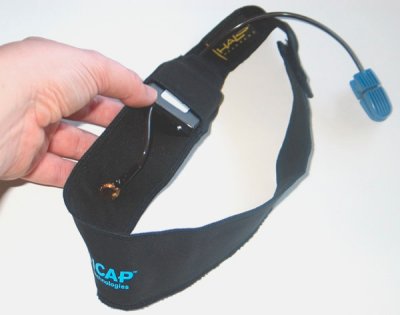 Neurofeedback is one of the most promising techniques we have for improving brain function and cognitive performance through systematic training. As we have discussed on the Next Brain Blog before:
Neurofeedback is one of the most promising techniques we have for improving brain function and cognitive performance through systematic training. As we have discussed on the Next Brain Blog before:
Neurofeedback training devices translate brainwaves into an external signal such sounds, graphs on a computer screen, movement of your computer’s cursor, action in a video game and even the motion of remote controlled toys.
Getting access to professional grade equipment can be very expensive. Consumer devices such as Neurosky’s headset or Emotiv’s EPOC (both of which I own) cost just a few hundred dollars but have limited functionality.
The market might be changing.
ICAP Technologies is offering the ICAP Release Meter, a professional grade neurofeedback system for $995. To get this price you need to use the coupon code available on the Mindware Forum. The Mindware Forum offers a good review of ICAP including a video interview.
Interested to hear from readers that have used the ICAP system or any at-home EEG-based neurofeedback training device.
Categories: Manage Emotions, Memory and Learning, Mental Focus, Software, Training Tags: brain training, neurofeeback
Boost Happiness by 25% with Simple Gratitudes
 By consciously cultivating a sense of gratitude you can improve happiness by 25%. While this does not raise your IQ it definitely raises you emotional quotient or EQ by developing skills in recognizing and managing emotions.
By consciously cultivating a sense of gratitude you can improve happiness by 25%. While this does not raise your IQ it definitely raises you emotional quotient or EQ by developing skills in recognizing and managing emotions.
But how do you cultivate gratitude? For some excellent practical tips check out Enhance Happiness and Health by Cultivating Gratitude: Interview with Robert Emmons. Some examples:
“The most common method we use in our research is to ask people to keep a “Gratitude Journal” where you write something you feel grateful for. Doing so 4 times a week, for as little as 3 weeks, is often enough to create a meaningful difference in one’s level of happiness. Another exercise is to write a “Gratitude Letter” to a person who has exerted a positive influence on one’s life but whom we have not properly thanked in the past, and then to meet that person and read the letter to them face to face.”
I am interested to hear from readers that use specific techniques for building EQ through practicing gratitudes.
Categories: IQ and EQ, Lifestyle, Manage Emotions Tags: EQ, experiential learning, smart phone
Neurobics: Low-Effort Cognitive Stimulation!
 Neurobics is a unique approach to brain training developed from the latest findings in neurobiology. According to one popular approach, Keeping Your Brain Alive, the core idea is this:
Neurobics is a unique approach to brain training developed from the latest findings in neurobiology. According to one popular approach, Keeping Your Brain Alive, the core idea is this:
“Neurobic exercises use your five physical senses and your emotional sense in unexpected ways and encourage you to shake up your everyday routines. Neurobics don’t require paper and pen or isolating yourself with puzzles. Everyday life is the Neurobic Brain gym. They can be done anywhere, anytime in offbeat, fun and easy ways while you’re getting up, commuting, working, eating, shopping or relaxing. They are designed to help the brain manufacture its own nutrients that strengthen, preserve and grow brain cells.”
Some examples:
- Take a different route when commuting to work this morning
- Brush your teeth with the other hand
- Use just the sense of touch when unlocking a door (don’t look at the lock)
- Move your waste basket at work
- Sit someone different at the dinner table tonight
Tiny changes with a significant and positive neurochemical impact. Any exercise can be Neurobic as long as it involves your senses in a new context, demands attention and breaks routine. This means we can design our own! The Keep Your Brain Alive Program was developed by Larry Katz a well-known Duke University Neurobiologist and includes 83 very specific things to try.
Interested to hear from readers that do Neurobics. What exercises do you do and how have you built them into your daily routine?
Categories: Books, Cognitive Decline, Lifestyle, Manage Emotions, Mental Focus, Perception Tags: brain training, experiential learning
Does Raising a Child Make You Smarter?
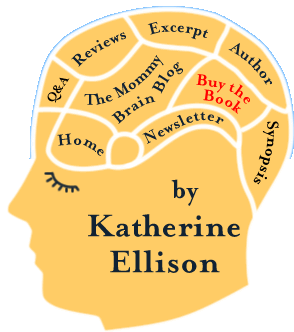 Absolutely, if you are the Mother! At least that is the argument made Katherine Ellison in her book the Mommy Brain: How Motherhood Makes Us Smarter.
Absolutely, if you are the Mother! At least that is the argument made Katherine Ellison in her book the Mommy Brain: How Motherhood Makes Us Smarter.
Motherhood gives a brain boost in many ways including face reading, multi-tasking, fearlessness, serenity, empathy, assertiveness and mental dexterity. These improvements in both IQ and EQ come from a combination of new hormones, motivation and practice that motherhood brings about.
The book is well founded in the latest neuroscience. It upends the stereotype of mothers checking their brains at the delivery room doors. Check out the Mommy Brain site by clicking on the graphic to the right.
Categories: Books, IQ and EQ, Lifestyle, Manage Emotions, Mental Focus, Parent, Perception Tags: embodied cognition, EQ

